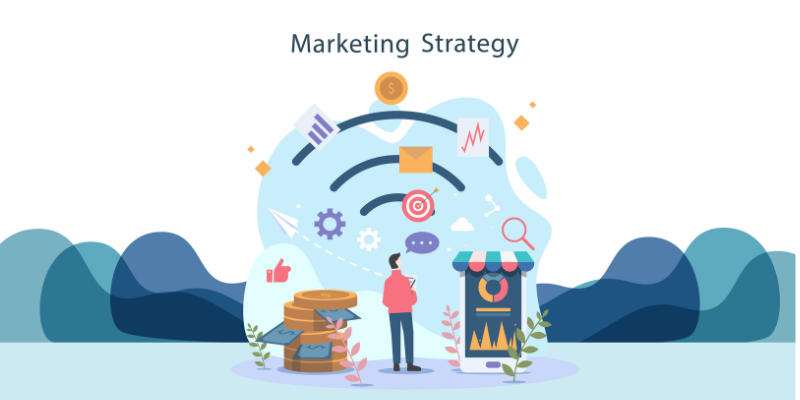According to HubSpot, 85% of industrial marketers have a defined industrial marketing strategy, highlighting its crucial role in the sector. Industrial marketing focuses on selling goods and services to other businesses, aiming to increase brand awareness, lead generation, and sales.

Adopting a strategic approach enables companies to streamline their efforts, efficiently allocate resources, and significantly improve their return on investment (ROI). This article delves into mastering these strategies, ensuring your marketing reaches and resonates with the appropriate industrial audience.
First Step is Understanding Your Market
- Market Research
Market research is vital in industrial marketing for understanding market dynamics and customer needs. It helps companies avoid costly mistakes, identify new opportunities, and tailor products and strategies to meet specific industry demands. Effective market research ensures that marketing efforts are both targeted and efficient.
- Identifying Your Target Audience
Defining your target audience in industrial marketing involves a detailed analysis of potential buyers’ needs, behaviors, and decision-making processes. Segment the market by industry type, company size, and location, and then delve into the roles of key decision-makers. This targeted approach ensures your marketing messages resonate more effectively, boosting engagement and improving conversion rates.
Digital Industrial Marketing Strategies for Businesses
- Website Optimization

A website is crucial in industrial marketing as it serves the primary touchpoint for business information and engagement. An effective industrial website must be user-friendly, fast, and mobile-responsive, and it should communicate value through professional design and relevant, easy-to-access content.
- Search Engine Optimization (SEO)
For industrial companies, SEO is essential to enhance online visibility and attract more business leads. Tailored SEO strategies should include optimizing technical website elements, using industry-specific keywords, and building quality backlinks. These efforts improve search rankings and draw in a targeted audience of industrial buyers.
- Content Marketing
Effective content for industrial audiences includes blogs, whitepapers, and case studies. These should provide valuable insights into industry trends, solutions to common problems, and evidence of your expertise. Creating engaging, informative content educates and builds trust with industrial professionals, encouraging deeper engagement with your brand.
Leveraging Technology in Industrial Marketing Strategy
1. Marketing Automation
- Benefits of Marketing Automation:
Marketing automation streamlines communication, enhances lead management, and increases marketing efficiency, allowing industrial companies to nurture leads more effectively and close deals faster.
- Best Practices for Implementation:
- Define clear objectives for automation.
- Choose the right tools that integrate seamlessly with existing systems.
- Train your team thoroughly.
- Continuously analyze and optimize automation strategies for best results.
2. Data Analytics
- Using Data Analytics:
Data analytics helps refine marketing strategies by providing insights into customer behavior, campaign performance, and market trends. By analyzing these data points, companies can make informed decisions to enhance their marketing efforts.

- Tools and Techniques:
- Use predictive analytics to forecast trends and customer behavior.
- Employ A/B testing to determine the most effective marketing strategies.
- Leverage tools like Google Analytics and CRM systems to track and measure marketing performance comprehensively.
Building Relationships and Networking
- Maximizing Impact With Trade Shows and Events
Trade shows are crucial for industrial marketing as they provide a platform for direct engagement with potential customers and industry peers. To maximize ROI from trade shows, focus on pre-event marketing, have a well-designed booth, and ensure your team is well-prepared to discuss products and solutions. Follow up promptly with leads gathered to convert interest into business opportunities.
- Leveraging Strategic Partnership and Collaboration
Forming strategic partnerships can extend your market reach and enhance your offerings. Effective strategies include identifying partners with complementary strengths, aligning goals, and creating joint marketing plans.
Successful case studies often highlight partnerships that leverage combined expertise to tackle complex market challenges, resulting in increased sales and improved market penetration.
Adapting to Changing Markets
- Keeping up with Industry Trends
Staying informed about industrial marketing trends requires a proactive approach. Regularly follow industry publications, attend relevant trade shows, and participate in professional networks.
Predictions for future trends indicate an increased focus on digital marketing, sustainability, and personalized customer experiences. Keeping abreast of these trends ensures that your industrial marketing strategies remain relevant and competitive.
- Embracing Innovation and Adaptability in Marketing Strategies
Innovative and adaptive marketing strategies are essential for staying ahead in a fluctuating market. Case studies, such as those involving the successful integration of AI in customer service or the adoption of green marketing tactics, highlight the benefits of responsiveness.
To pivot your strategy effectively, continuously evaluate your marketing efforts, gather feedback, and be ready to embrace new technologies and methods that align with emerging industry developments.
Conclusion
Adopting a holistic and adaptive industrial marketing strategy is key to navigating the dynamic market landscape. At Infiniqe, our branding and marketing services are tailored to enhance your industrial marketing strategy, ensuring it remains cutting-edge and effective.
Reach out to discover how we can help you refine your approach and achieve superior results in industrial marketing.
